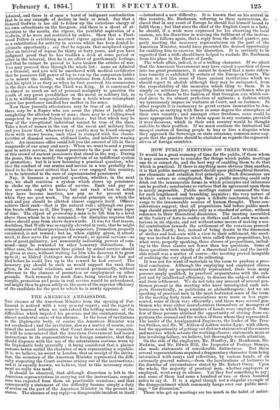THE AMERICAN AMBASSADOR
THE absence of the American Minister from the opening of Par- liament is noticed with a very general regret ; and the regret is scarcely lessened when we understand the trifling nature of the difficulties which impeded his presence and the unintentional, the almost accidental cause of his absence. In the issue of invitations to the Diplomatic body, of course the American Minister .a as not overlooked ; and the invitation, also as a matter of course, con- tained the usual intimation that Court dress would be requisite. It will be remembered that the American Government had issued instructions to its representatives in foreign countries, that they should dispense with the use of the ostentatious costume worn by the Diplomatic body generally ; it being considered that a plainer costume better suited the character of men representing a republic. It is, we believe, no secret in London that on receipt of the invita- tion, the secretary of the American London, represented the diffi- culty respecting the Court costume arising out of the instructions ; and it is equally known, we believe, that to this necessary state- ment no reply was made.
It should be observed, that although discretion is left to the American representatives in carrying out the instructions, compli- ance was expected from them on practicable occasions; and that consequently a statement of the difficulty became simply a duty of course on the part of the American Minister in the present in- stance. The absence of any reply—a disagreeable incident in itself —introduced a new difficulty. It is known that on his arrival in this country, Mr. Buchanan, referring to these instructions de- clared that in any court of Europe he should feel himself bound to fulfil them ; but that since the chief of the English Court is a lady, he should, if a wish were expressed for his observing the local custom, use his discretion in waiving the fulfilment of the instruc- tions. It follows again, that a reply from the official quarter, pro- perly meeting the necessary representation on the part of the American Minister, would have presented the desired opportunity for enabling him to exercise his discretion. It is seriously to be regretted that a trifle should have helped to exclude Mr. Buchanan from his place in the House of Lords.
The whole affair, indeed, is of a trifling character. If we admit that the American Government may have raised a question of dress into too great prominence, it cannot be denied that a more ridicu- lous tenacity is exhibited by certain of the European Courts. The custom is not like some of those ancient institutions which we should regret to abolish although they may be antiquated, from the respectability of the memories which cling to them. It is simply an arbitrary law, compelling ladies and gentlemen who go to Court to adhere to the fashion of that Georgian sera which car- ried dress to its utmost perfection of ugliness; a fashion which we tyrannously impose on visitants at Court, and on footmen. In other respects it is customary to grant certain immunities to Am- bassadors, as carrying with them in some degree the atmosphere of their own country ; and amongst other freedoms, none could be more appropriate than to let them appear in any costume, provided it were decorous, which in their own country would be thought suitable to their position. If we must oontinue the fantastical bal masque custom of forcing people to buy or hire a disguise when they approach the Sovereign on state occasions, common sense sug- gests that the practice Should be abolished as regards the represent- atives of foreign countries.


































 Previous page
Previous page